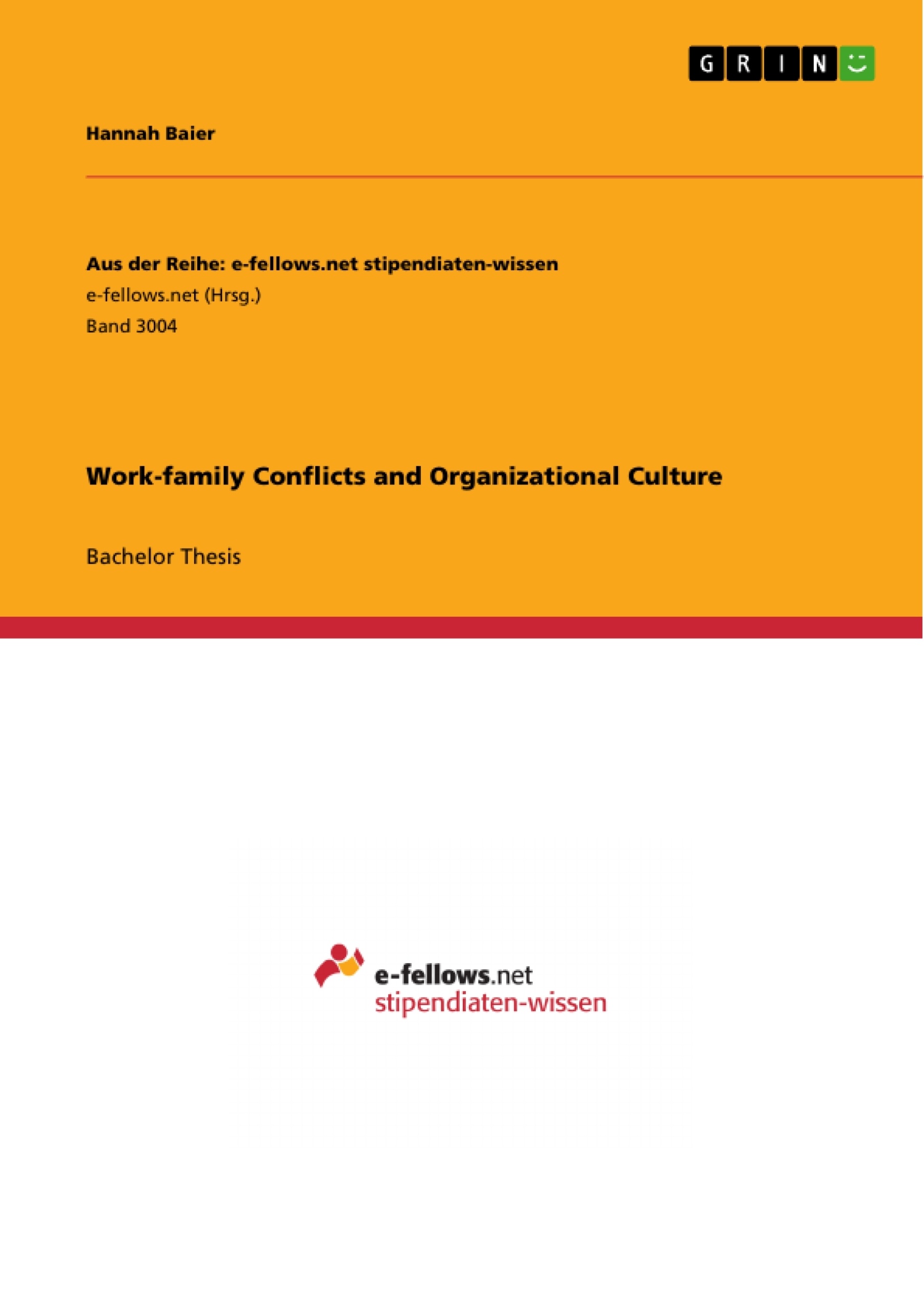Over the last decades the state and employers have acknowledged the importance of dealing with the work-family interface. In order to guide legislation and employers it is crucial to know which kind of initiatives are effective in helping employees fulfill the demands of work and family. This and other reasons have lead to a required increase of scholar interest in the work-family interface.
This thesis integrates research findings concerning the characteristics of organizational culture that help to reduce work-family conflicts and investigates some variables possibly influencing the relationship between characteristics of the organizational culture and work-family conflict. However only the impact of supportive supervision and flexible work arrangements on work-family conflicts are elaborated.
The thesis is structured as follows. Firstly, the relevant concepts are defined and it is explained how work-family conflicts arise including the underlying most common theories. Afterwards, a comprehensive and qualitative review of the state of research concerning the impact of characteristics of organizational culture on work-family conflicts in 2016 s given. Finally, the findings and limitations of this thesis are discussed and suggestions for future research are made.
Inhaltsverzeichnis (Table of Contents)
- Introduction
- Relevance for Research and Practice
- Research Question and Objectives
- Theoretical Background
- Definitions
- Organizational Culture
- Work-family Conflict
- The Emergence of Work-family Conflicts
- The Impact of Organizational Culture on Work-family Conflicts
- The Current State of Research concerning Supportive Supervision
- The Current State of Research concerning Flexible Work Arrangements
- The Current State of Research concerning Variables possibly influencing the established Relationships
- Discussion
Zielsetzung und Themenschwerpunkte (Objectives and Key Themes)
This thesis aims to investigate the characteristics of organizational culture that help to reduce work-family conflicts. It examines the impact of supportive supervision and flexible work arrangements on work-family conflicts, while also considering potential mediators and moderators of these relationships.
- The impact of organizational culture on work-family conflicts.
- The role of supportive supervision in reducing work-family conflicts.
- The influence of flexible work arrangements on work-family conflicts.
- The moderating effects of demographic variables on the relationship between organizational culture and work-family conflicts.
- The mediating role of perceived control in the relationship between organizational culture and work-family conflicts.
Zusammenfassung der Kapitel (Chapter Summaries)
The first chapter introduces the topic of work-family conflicts and its relevance in today's workforce. It defines the research question and objectives of the thesis. Chapter two provides a theoretical background for the study, defining key concepts such as organizational culture, work-family conflict, and the different types of work-family conflicts. It also explores the theoretical frameworks used to explain the emergence of these conflicts.
Chapter three focuses on the impact of organizational culture on work-family conflicts. It reviews the current state of research on supportive supervision and flexible work arrangements, examining their individual effects and their potential interaction with factors such as gender, family structure, and perception of control.
Schlüsselwörter (Keywords)
This work focuses on the intersection of organizational culture, work-family conflicts, supportive supervision, flexible work arrangements, and the potential influence of demographic variables such as gender and family structure. The study utilizes theories such as role theory and the Conservation of Resources (COR) model to explore these complex relationships.
Frequently Asked Questions
How does organizational culture affect work-family conflicts?
Organizational culture can either increase or reduce work-family conflicts depending on its characteristics, such as the level of support for employees' family lives.
What is the role of supportive supervision in this context?
Supportive supervision is a key factor in reducing work-family conflicts, as managers who understand family needs help employees balance their dual roles more effectively.
Do flexible work arrangements always help?
While generally beneficial, the impact of flexible work arrangements can be influenced by variables like gender, family structure, and the employee's perception of control.
Which theories explain the emergence of work-family conflicts?
The thesis utilizes Role Theory and the Conservation of Resources (COR) model to explain how demands from different life domains compete for limited personal resources.
What are the objectives of this thesis?
The objective is to investigate characteristics of organizational culture that reduce work-family conflicts and to identify mediators and moderators in these relationships.
- Quote paper
- Hannah Baier (Author), 2016, Work-family Conflicts and Organizational Culture, Munich, GRIN Verlag, https://www.grin.com/document/448521



